Helper methods for InputVar¶
This tutorial complements the general tutorial on the uncertainty and sensitivity analysis module unsequa.
The InputVar class provides a few helper methods to generate generic uncertainty input variables for exposures, impact function sets, hazards, and entities (including measures cost and disc rates).
Table of Contents
1 Helper methods for InputVar
1.1 Exposures
1.1.1 Example: single exposures
1.1.2 Example: list of litpop exposures with different exponents
1.2 Hazard
1.3 ImpactFuncSet
1.4 Entity
1.4.1 Example: single exposures
1.4.2 Example: list of Litpop exposures with different exponents
1.5 Entity Future
1.5.1 Example: single exposures
1.5.2 Example: list of exposures
[1]:
import warnings
warnings.filterwarnings('ignore') #Ignore warnings for making the tutorial's pdf.
Exposures¶
The following types of uncertainties can be added:
ET: scale the total value (homogeneously) The value at each exposure point is multiplied by a number sampled uniformly from a distribution with (min, max) = bounds_totvalue
EN: mutliplicative noise (inhomogeneous) The value of each exposure point is independently multiplied by a random number sampled uniformly from a distribution with (min, max) = bounds_noise. EN is the value of the seed for the uniform random number generator.
EL: sample uniformly from exposure list From the provided list of exposure is elements are uniformly sampled. For example, LitPop instances with different exponents.
If a bounds is None, this parameter is assumed to have no uncertainty.
Example: single exposures¶
[2]:
#Define the base exposure
from climada.util.constants import EXP_DEMO_H5
from climada.entity import Exposures
exp_base = Exposures.from_hdf5(EXP_DEMO_H5)
2022-01-10 21:10:32,810 - climada.entity.exposures.base - INFO - Reading /Users/ckropf/climada/demo/data/exp_demo_today.h5
[3]:
from climada.engine.unsequa import InputVar
bounds_totval = [0.9, 1.1] #+- 10% noise on the total exposures value
bounds_noise = [0.9, 1.2] #-10% - +20% noise each exposures point
exp_iv = InputVar.exp([exp_base], bounds_totval, bounds_noise)
[4]:
#The difference in total value between the base exposure and the average input uncertainty exposure
#due to the random noise on each exposures point (the average change in the total value is 1.0).
avg_exp = exp_iv.evaluate()
(sum(avg_exp.gdf['value']) - sum(exp_base.gdf['value'])) / sum(exp_base.gdf['value'])
[4]:
0.03700231587024304
[5]:
#The values for EN are seeds for the random number generator for the noise sampling and
#thus are uniformly sampled numbers between (0, 2**32-1)
exp_iv.plot();
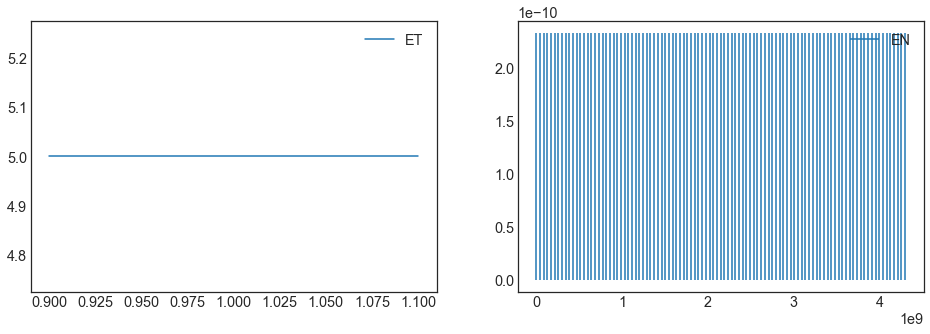
Example: list of litpop exposures with different exponents¶
[6]:
#Define a generic method to make litpop instances with different exponent pairs.
from climada.entity import LitPop
def generate_litpop_base(impf_id, value_unit, haz, assign_centr_kwargs,
choice_mn, **litpop_kwargs):
#In-function imports needed only for parallel computing on Windows
from climada.entity import LitPop
litpop_base = []
for [m, n] in choice_mn:
print('\n Computing litpop for m=%d, n=%d \n' %(m, n))
litpop_kwargs['exponents'] = (m, n)
exp = LitPop.from_countries(**litpop_kwargs)
exp.gdf['impf_' + haz.tag.haz_type] = impf_id
exp.gdf.drop('impf_', axis=1, inplace=True)
if value_unit is not None:
exp.value_unit = value_unit
exp.assign_centroids(haz, **assign_centr_kwargs)
litpop_base.append(exp)
return litpop_base
[7]:
#Define the parameters of the LitPop instances
tot_pop = 11.317e6
impf_id = 1
value_unit = 'people'
litpop_kwargs = {
'countries' : ['CUB'],
'res_arcsec' : 300,
'reference_year' : 2020,
'fin_mode' : 'norm',
'total_values' : [tot_pop]
}
assign_centr_kwargs={}
# The hazard is needed to assign centroids
from climada.util.constants import HAZ_DEMO_H5
from climada.hazard import Hazard
haz = Hazard.from_hdf5(HAZ_DEMO_H5)
2022-01-10 21:10:33,708 - climada.hazard.base - INFO - Reading /Users/ckropf/climada/demo/data/tc_fl_1990_2004.h5
[8]:
#Generate the LitPop list
choice_mn = [[0, 0.5], [0, 1], [0, 2]] #Choice of exponents m,n
litpop_list = generate_litpop_base(impf_id, value_unit, haz, assign_centr_kwargs, choice_mn, **litpop_kwargs)
Computing litpop for m=0, n=0
2022-01-10 21:10:33,998 - climada.entity.exposures.litpop.litpop - INFO -
LitPop: Init Exposure for country: CUB (192)...
2022-01-10 21:10:33,999 - climada.entity.exposures.litpop.gpw_population - INFO - GPW Version v4.11
2022-01-10 21:10:35,544 - climada.entity.exposures.base - INFO - Hazard type not set in impf_
2022-01-10 21:10:35,545 - climada.entity.exposures.base - INFO - category_id not set.
2022-01-10 21:10:35,545 - climada.entity.exposures.base - INFO - cover not set.
2022-01-10 21:10:35,546 - climada.entity.exposures.base - INFO - deductible not set.
2022-01-10 21:10:35,546 - climada.entity.exposures.base - INFO - centr_ not set.
2022-01-10 21:10:35,549 - climada.entity.exposures.base - INFO - Matching 1388 exposures with 2500 centroids.
2022-01-10 21:10:35,551 - climada.util.coordinates - INFO - No exact centroid match found. Reprojecting coordinates to nearest neighbor closer than the threshold = 100
2022-01-10 21:10:35,577 - climada.util.interpolation - WARNING - Distance to closest centroid is greater than 100km for 77 coordinates.
Computing litpop for m=0, n=1
2022-01-10 21:10:35,824 - climada.entity.exposures.litpop.litpop - INFO -
LitPop: Init Exposure for country: CUB (192)...
2022-01-10 21:10:35,825 - climada.entity.exposures.litpop.gpw_population - INFO - GPW Version v4.11
2022-01-10 21:10:37,238 - climada.entity.exposures.base - INFO - Hazard type not set in impf_
2022-01-10 21:10:37,239 - climada.entity.exposures.base - INFO - category_id not set.
2022-01-10 21:10:37,239 - climada.entity.exposures.base - INFO - cover not set.
2022-01-10 21:10:37,239 - climada.entity.exposures.base - INFO - deductible not set.
2022-01-10 21:10:37,240 - climada.entity.exposures.base - INFO - centr_ not set.
2022-01-10 21:10:37,243 - climada.entity.exposures.base - INFO - Matching 1388 exposures with 2500 centroids.
2022-01-10 21:10:37,245 - climada.util.coordinates - INFO - No exact centroid match found. Reprojecting coordinates to nearest neighbor closer than the threshold = 100
2022-01-10 21:10:37,269 - climada.util.interpolation - WARNING - Distance to closest centroid is greater than 100km for 77 coordinates.
Computing litpop for m=0, n=2
2022-01-10 21:10:37,499 - climada.entity.exposures.litpop.litpop - INFO -
LitPop: Init Exposure for country: CUB (192)...
2022-01-10 21:10:37,501 - climada.entity.exposures.litpop.gpw_population - INFO - GPW Version v4.11
2022-01-10 21:10:38,888 - climada.entity.exposures.base - INFO - Hazard type not set in impf_
2022-01-10 21:10:38,889 - climada.entity.exposures.base - INFO - category_id not set.
2022-01-10 21:10:38,889 - climada.entity.exposures.base - INFO - cover not set.
2022-01-10 21:10:38,890 - climada.entity.exposures.base - INFO - deductible not set.
2022-01-10 21:10:38,891 - climada.entity.exposures.base - INFO - centr_ not set.
2022-01-10 21:10:38,894 - climada.entity.exposures.base - INFO - Matching 1388 exposures with 2500 centroids.
2022-01-10 21:10:38,895 - climada.util.coordinates - INFO - No exact centroid match found. Reprojecting coordinates to nearest neighbor closer than the threshold = 100
2022-01-10 21:10:38,919 - climada.util.interpolation - WARNING - Distance to closest centroid is greater than 100km for 77 coordinates.
[9]:
from climada.engine.unsequa import InputVar
bounds_totval = [0.9, 1.1] #+- 10% noise on the total exposures value
litpop_iv = InputVar.exp(exp_list = litpop_list,
bounds_totval=bounds_totval)
[10]:
# To choose n=0.5, we have to set EL=1 (the index of 0.5 in choice_n = [0, 0.5, 1, 2])
pop_half = litpop_iv.evaluate(ET=1, EL=1)
[11]:
pop_half.gdf.tail()
[11]:
| value | geometry | latitude | longitude | region_id | impf_TC | centr_TC | |
|---|---|---|---|---|---|---|---|
| 1383 | 1713.015083 | POINT (-78.29167 22.45833) | 22.458333 | -78.291667 | 192 | 1 | 431 |
| 1384 | 1085.168934 | POINT (-79.20833 22.62500) | 22.625000 | -79.208333 | 192 | 1 | 476 |
| 1385 | 950.764517 | POINT (-79.62500 22.79167) | 22.791667 | -79.625000 | 192 | 1 | 524 |
| 1386 | 1129.619078 | POINT (-79.45833 22.70833) | 22.708333 | -79.458333 | 192 | 1 | 475 |
| 1387 | 300.552289 | POINT (-80.79167 23.20833) | 23.208333 | -80.791667 | 192 | 1 | 617 |
[12]:
pop_half.plot_hexbin();

[13]:
# To choose n=1, we have to set EL=2 (the index of 1 in choice_n = [0, 0.5, 1, 2])
pop_one = litpop_iv.evaluate(ET=1, EL=2)
[14]:
pop_one.gdf.tail()
[14]:
| value | geometry | latitude | longitude | region_id | impf_TC | centr_TC | |
|---|---|---|---|---|---|---|---|
| 1383 | 56.491498 | POINT (-78.29167 22.45833) | 22.458333 | -78.291667 | 192 | 1 | 431 |
| 1384 | 22.670204 | POINT (-79.20833 22.62500) | 22.625000 | -79.208333 | 192 | 1 | 476 |
| 1385 | 17.402300 | POINT (-79.62500 22.79167) | 22.791667 | -79.625000 | 192 | 1 | 524 |
| 1386 | 24.565452 | POINT (-79.45833 22.70833) | 22.708333 | -79.458333 | 192 | 1 | 475 |
| 1387 | 1.739005 | POINT (-80.79167 23.20833) | 23.208333 | -80.791667 | 192 | 1 | 617 |
[15]:
pop_one.plot_hexbin();
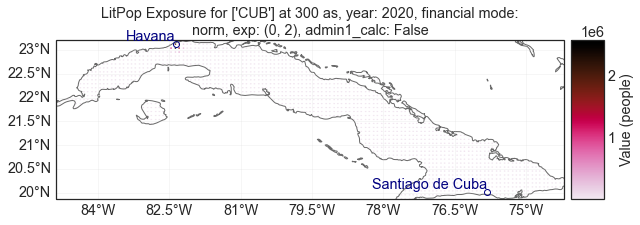
[16]:
#The values for EN are seeds for the random number generator for the noise sampling and
#thus are uniformly sampled numbers between (0, 2**32-1)
litpop_iv.plot();

Hazard¶
The following types of uncertainties can be added:
HE: sub-sampling events from the total event set For each sub-sample, n_ev events are sampled with replacement. HE is the value of the seed for the uniform random number generator.
HI: scale the intensity of all events (homogeneously) The instensity of all events is multiplied by a number sampled uniformly from a distribution with (min, max) = bounds_int
HF: scale the frequency of all events (homogeneously) The frequency of all events is multiplied by a number sampled uniformly from a distribution with (min, max) = bounds_freq
If a bounds is None, this parameter is assumed to have no uncertainty.
[17]:
#Define the base exposure
from climada.util.constants import HAZ_DEMO_H5
from climada.hazard import Hazard
haz_base = Hazard.from_hdf5(HAZ_DEMO_H5)
2022-01-10 21:10:43,742 - climada.hazard.base - INFO - Reading /Users/ckropf/climada/demo/data/tc_fl_1990_2004.h5
[18]:
from climada.engine.unsequa import InputVar
bounds_freq = [0.9, 1.1] #+- 10% noise on the frequency of all events
bounds_int = None #No uncertainty on the intensity
n_ev = None
haz_iv = InputVar.haz(haz_base, n_ev=n_ev, bounds_freq=bounds_freq, bounds_int=bounds_int)
[19]:
#The difference in frequency for HF=1.1 is indeed 10%.
haz_high_freq = haz_iv.evaluate(HE=n_ev, HI=None, HF = 1.1)
(sum(haz_high_freq.frequency) - sum(haz_base.frequency)) / sum(haz_base.frequency)
[19]:
0.10000000000000736
[20]:
bounds_freq = [0.9, 1.1] #+- 10% noise on the frequency of all events
bounds_int = None #No uncertainty on the intensity
n_ev = round(0.8 * haz_base.size) #sub-sample with re-draw events to obtain hazards with n=0.8*tot_number_events
haz_iv = InputVar.haz(haz_base, n_ev=n_ev, bounds_freq=bounds_freq, bounds_int=bounds_int)
Note that the HE is not a univariate distribution, but for each sample corresponds to the names of the sub-sampled events. However, to simplify the data stream, the HE is saved as the seed for the random number generator that made the smaple. Hence, the value of HE is a label for the given sample. If really needed, the exact chosen events can be obtained as follows.
[21]:
import numpy as np
HE = 2618981871 #The random seed (number between 0 and 2**32)
rng = np.random.RandomState(int(HE)) #Initialize a random state with the seed
chosen_ev = list(rng.choice(haz_base.event_name, int(n_ev))) #Obtain the corresponding events
[22]:
#The first event is
chosen_ev[0]
[22]:
'1998209N11335'
[23]:
#The values for HE are seeds for the random number generator for the noise sampling and
#thus are uniformly sampled numbers between (0, 2**32-1)
haz_iv.plot();
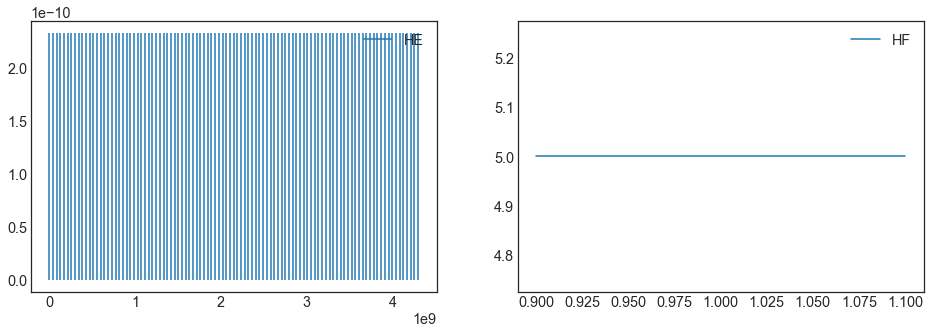
The number of events per sub-sample is equal to n_ev
[24]:
#The number of events per sample is equal to n_ev
haz_sub = haz_iv.evaluate(HE=928165924, HI=None, HF = 1.1)
#The number for HE is irrelevant, as all samples have the same n_Ev
haz_sub.size - n_ev
[24]:
0
ImpactFuncSet¶
The following types of uncertainties can be added: - MDD: scale the mdd (homogeneously) The value of mdd at each intensity is multiplied by a number sampled uniformly from a distribution with (min, max) = bounds_mdd - PAA: scale the paa (homogeneously) The value of paa at each intensity is multiplied by a number sampled uniformly from a distribution with (min, max) = bounds_paa - IFi: shift the intensity (homogeneously) The value intensity are all summed with a random number sampled uniformly from a distribution with (min, max) = bounds_int
If a bounds is None, this parameter is assumed to have no uncertainty.
[25]:
from climada.entity import ImpactFuncSet, ImpfTropCyclone
impf = ImpfTropCyclone.from_emanuel_usa()
impf_set_base = ImpactFuncSet()
impf_set_base.append(impf)
It is necessary to specify the hazard type and the impact function id. For simplicity, the default uncertainty input variable only looks at the uncertainty on one single impact function.
[26]:
from climada.engine.unsequa import InputVar
bounds_impfi = [-10, 10] #-10 m/s ; +10m/s uncertainty on the intensity
bounds_mdd = [0.7, 1.1] #-30% - +10% uncertainty on the mdd
bounds_paa = None #No uncertainty in the paa
impf_iv = InputVar.impfset(impf_set_base,
bounds_impfi=bounds_impfi,
bounds_mdd=bounds_mdd,
bounds_paa=bounds_paa,
haz_id_dict={'TC': [1]})
[27]:
#Plot the impact function for 50 random samples (note for the expert, these are not global)
n = 50
ax = impf_iv.evaluate().plot()
inten = impf_iv.distr_dict['IFi'].rvs(size=n)
mdd = impf_iv.distr_dict['MDD'].rvs(size=n)
for i, m in zip(inten, mdd):
impf_iv.evaluate(IFi=i, MDD=m).plot(axis=ax)
ax.get_legend().remove()
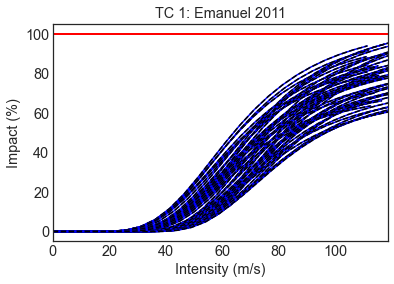
Entity¶
The following types of uncertainties can be added: - DR: value of constant discount rate (homogeneously) The value of the discounts in each year is sampled uniformly from a distribution with (min, max) = bounds_disc - CO: scale the cost (homogeneously) The cost of all measures is multiplied by the same number sampled uniformly from a distribution with (min, max) = bounds_cost - ET: scale the total value (homogeneously) The value at each exposure point is multiplied by a number sampled uniformly from a distribution with (min, max) = bounds_totval - EN: mutliplicative noise (inhomogeneous) The value of each exposure point is independently multiplied by a random number sampled uniformly from a distribution with (min, max) = bounds_noise. EN is the value of the seed for the uniform random number generator. - EL: sample uniformly from exposure list From the provided list of exposure is elements are uniformly sampled. For example, LitPop instances with different exponents. - MDD: scale the mdd (homogeneously) The value of mdd at each intensity is multiplied by a number sampled uniformly from a distribution with (min, max) = bounds_mdd - PAA: scale the paa (homogeneously) The value of paa at each intensity is multiplied by a number sampled uniformly from a distribution with (min, max) = bounds_paa - IFi: shift the intensity (homogeneously) The value intensity are all summed with a random number sampled uniformly from a distribution with (min, max) = bounds_int
If a bounds is None, this parameter is assumed to have no uncertainty.
Example: single exposures¶
[28]:
from climada.entity import Entity
from climada.util.constants import ENT_DEMO_TODAY
ent = Entity.from_excel(ENT_DEMO_TODAY)
ent.exposures.ref_year = 2018
ent.check()
2022-01-10 21:10:47,184 - climada.entity.exposures.base - INFO - category_id not set.
2022-01-10 21:10:47,185 - climada.entity.exposures.base - INFO - geometry not set.
2022-01-10 21:10:47,185 - climada.entity.exposures.base - INFO - region_id not set.
2022-01-10 21:10:47,185 - climada.entity.exposures.base - INFO - centr_ not set.
[29]:
from climada.engine.unsequa import InputVar
ent_iv = InputVar.ent(
impf_set = ent.impact_funcs,
disc_rate = ent.disc_rates,
exp_list = [ent.exposures],
meas_set = ent.measures,
bounds_disc=[0, 0.08],
bounds_cost=[0.5, 1.5],
bounds_totval=[0.9, 1.1],
bounds_noise=[0.3, 1.9],
bounds_mdd=[0.9, 1.05],
bounds_paa=None,
bounds_impfi=[-2, 5],
haz_id_dict={'TC': [1]}
)
[30]:
ent_iv.plot();
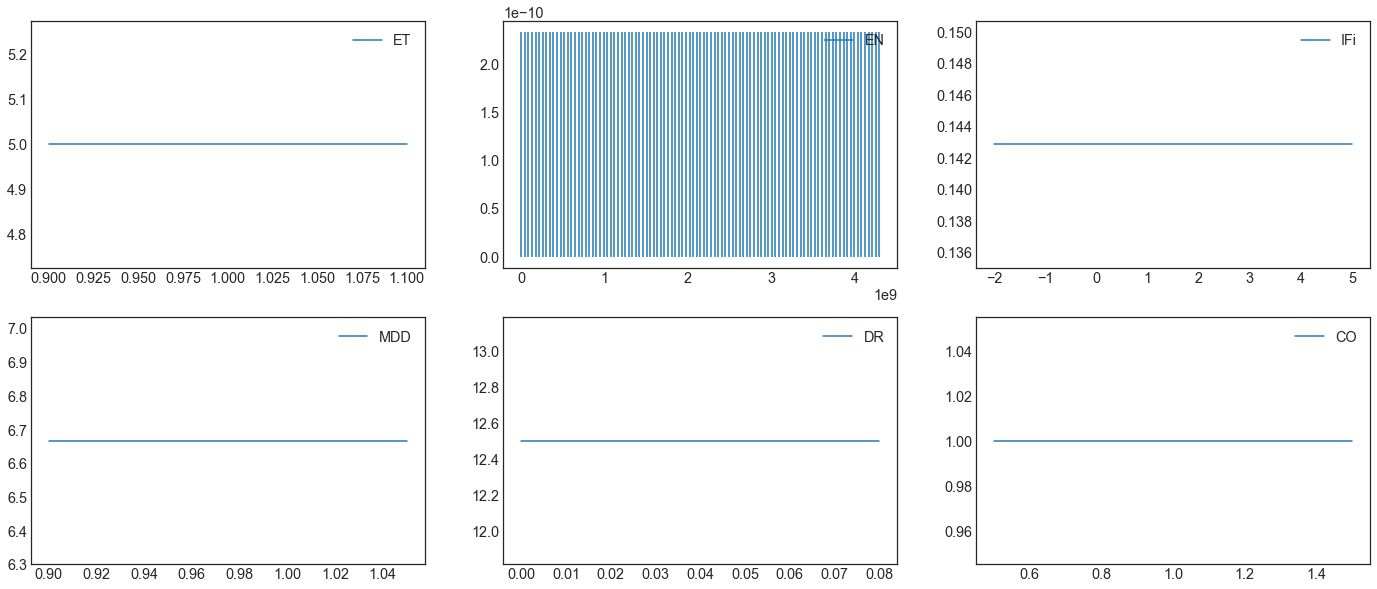
Example: list of Litpop exposures with different exponents¶
[31]:
#Define a generic method to make litpop instances with different exponent pairs.
from climada.entity import LitPop
def generate_litpop_base(impf_id, value_unit, haz, assign_centr_kwargs,
choice_mn, **litpop_kwargs):
#In-function imports needed only for parallel computing on Windows
from climada.entity import LitPop
litpop_base = []
for [m, n] in choice_mn:
print('\n Computing litpop for m=%d, n=%d \n' %(m, n))
litpop_kwargs['exponents'] = (m, n)
exp = LitPop.from_countries(**litpop_kwargs)
exp.gdf['impf_' + haz.tag.haz_type] = impf_id
exp.gdf.drop('impf_', axis=1, inplace=True)
if value_unit is not None:
exp.value_unit = value_unit
exp.assign_centroids(haz, **assign_centr_kwargs)
litpop_base.append(exp)
return litpop_base
[32]:
#Define the parameters of the LitPop instances
impf_id = 1
value_unit = None
litpop_kwargs = {
'countries' : ['CUB'],
'res_arcsec' : 300,
'reference_year' : 2020,
}
assign_centr_kwargs={}
# The hazard is needed to assign centroids
from climada.util.constants import HAZ_DEMO_H5
from climada.hazard import Hazard
haz = Hazard.from_hdf5(HAZ_DEMO_H5)
2022-01-10 21:10:47,851 - climada.hazard.base - INFO - Reading /Users/ckropf/climada/demo/data/tc_fl_1990_2004.h5
[33]:
#Generate the LitPop list
choice_mn = [[1, 0.5], [0.5, 1], [1, 1]] #Choice of exponents m,n
litpop_list = generate_litpop_base(impf_id, value_unit, haz, assign_centr_kwargs, choice_mn, **litpop_kwargs)
Computing litpop for m=1, n=0
2022-01-10 21:10:48,109 - climada.entity.exposures.litpop.litpop - INFO -
LitPop: Init Exposure for country: CUB (192)...
2022-01-10 21:10:48,111 - climada.entity.exposures.litpop.gpw_population - INFO - GPW Version v4.11
2022-01-10 21:10:49,491 - climada.util.finance - WARNING - No data available for country. Using non-financial wealth instead
2022-01-10 21:10:50,565 - climada.util.finance - INFO - GDP CUB 2020: 1.074e+11.
2022-01-10 21:10:50,570 - climada.util.finance - WARNING - No data for country, using mean factor.
2022-01-10 21:10:50,582 - climada.entity.exposures.base - INFO - Hazard type not set in impf_
2022-01-10 21:10:50,583 - climada.entity.exposures.base - INFO - category_id not set.
2022-01-10 21:10:50,583 - climada.entity.exposures.base - INFO - cover not set.
2022-01-10 21:10:50,584 - climada.entity.exposures.base - INFO - deductible not set.
2022-01-10 21:10:50,584 - climada.entity.exposures.base - INFO - centr_ not set.
2022-01-10 21:10:50,589 - climada.entity.exposures.base - INFO - Matching 1388 exposures with 2500 centroids.
2022-01-10 21:10:50,592 - climada.util.coordinates - INFO - No exact centroid match found. Reprojecting coordinates to nearest neighbor closer than the threshold = 100
2022-01-10 21:10:50,624 - climada.util.interpolation - WARNING - Distance to closest centroid is greater than 100km for 77 coordinates.
Computing litpop for m=0, n=1
2022-01-10 21:10:50,872 - climada.entity.exposures.litpop.litpop - INFO -
LitPop: Init Exposure for country: CUB (192)...
2022-01-10 21:10:50,874 - climada.entity.exposures.litpop.gpw_population - INFO - GPW Version v4.11
2022-01-10 21:10:52,432 - climada.util.finance - WARNING - No data available for country. Using non-financial wealth instead
2022-01-10 21:10:52,863 - climada.util.finance - INFO - GDP CUB 2020: 1.074e+11.
2022-01-10 21:10:52,867 - climada.util.finance - WARNING - No data for country, using mean factor.
2022-01-10 21:10:52,877 - climada.entity.exposures.base - INFO - Hazard type not set in impf_
2022-01-10 21:10:52,878 - climada.entity.exposures.base - INFO - category_id not set.
2022-01-10 21:10:52,878 - climada.entity.exposures.base - INFO - cover not set.
2022-01-10 21:10:52,879 - climada.entity.exposures.base - INFO - deductible not set.
2022-01-10 21:10:52,879 - climada.entity.exposures.base - INFO - centr_ not set.
2022-01-10 21:10:52,884 - climada.entity.exposures.base - INFO - Matching 1388 exposures with 2500 centroids.
2022-01-10 21:10:52,886 - climada.util.coordinates - INFO - No exact centroid match found. Reprojecting coordinates to nearest neighbor closer than the threshold = 100
2022-01-10 21:10:52,914 - climada.util.interpolation - WARNING - Distance to closest centroid is greater than 100km for 77 coordinates.
Computing litpop for m=1, n=1
2022-01-10 21:10:53,159 - climada.entity.exposures.litpop.litpop - INFO -
LitPop: Init Exposure for country: CUB (192)...
2022-01-10 21:10:53,161 - climada.entity.exposures.litpop.gpw_population - INFO - GPW Version v4.11
2022-01-10 21:10:54,584 - climada.util.finance - WARNING - No data available for country. Using non-financial wealth instead
2022-01-10 21:10:54,997 - climada.util.finance - INFO - GDP CUB 2020: 1.074e+11.
2022-01-10 21:10:55,001 - climada.util.finance - WARNING - No data for country, using mean factor.
2022-01-10 21:10:55,011 - climada.entity.exposures.base - INFO - Hazard type not set in impf_
2022-01-10 21:10:55,012 - climada.entity.exposures.base - INFO - category_id not set.
2022-01-10 21:10:55,012 - climada.entity.exposures.base - INFO - cover not set.
2022-01-10 21:10:55,013 - climada.entity.exposures.base - INFO - deductible not set.
2022-01-10 21:10:55,013 - climada.entity.exposures.base - INFO - centr_ not set.
2022-01-10 21:10:55,018 - climada.entity.exposures.base - INFO - Matching 1388 exposures with 2500 centroids.
2022-01-10 21:10:55,020 - climada.util.coordinates - INFO - No exact centroid match found. Reprojecting coordinates to nearest neighbor closer than the threshold = 100
2022-01-10 21:10:55,046 - climada.util.interpolation - WARNING - Distance to closest centroid is greater than 100km for 77 coordinates.
[34]:
from climada.entity import Entity
from climada.util.constants import ENT_DEMO_TODAY
ent = Entity.from_excel(ENT_DEMO_TODAY)
ent.exposures.ref_year = 2020
ent.check()
2022-01-10 21:10:55,139 - climada.entity.exposures.base - INFO - category_id not set.
2022-01-10 21:10:55,140 - climada.entity.exposures.base - INFO - geometry not set.
2022-01-10 21:10:55,140 - climada.entity.exposures.base - INFO - region_id not set.
2022-01-10 21:10:55,141 - climada.entity.exposures.base - INFO - centr_ not set.
[35]:
from climada.engine.unsequa import InputVar
ent_iv = InputVar.ent(
impf_set = ent.impact_funcs,
disc_rate = ent.disc_rates,
exp_list = litpop_list,
meas_set = ent.measures,
bounds_disc=[0, 0.08],
bounds_cost=[0.5, 1.5],
bounds_totval=[0.9, 1.1],
bounds_noise=[0.3, 1.9],
bounds_mdd=[0.9, 1.05],
bounds_paa=None,
bounds_impfi=[-2, 5],
haz_id_dict={'TC': [1]}
)
[36]:
ent_iv.evaluate().exposures.plot_hexbin()
[36]:
<GeoAxesSubplot:title={'center':"LitPop Exposure for ['CUB'] at 300 as, year: 2020, financial mode: pc,\nexp: (0.5, 1), admin1_calc: False"}>
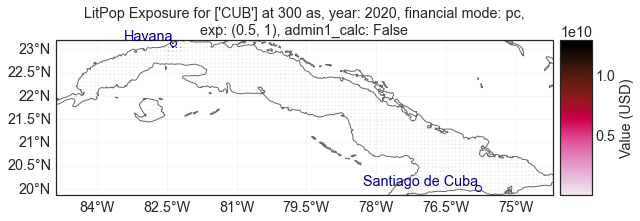
Entity Future¶
The following types of uncertainties can be added: - CO: scale the cost (homogeneously) The cost of all measures is multiplied by the same number sampled uniformly from a distribution with (min, max) = bounds_cost - EG: scale the exposures growth (homogeneously) The value at each exposure point is multiplied by a number sampled uniformly from a distribution with - EN: mutliplicative noise (inhomogeneous) The value of each exposure point is independently multiplied by a random number sampled uniformly from a distribution with (min, max) = bounds_noise. EN is the value of the seed for the uniform random number generator. - EL: sample uniformly from exposure list From the provided list of exposure is elements are uniformly sampled. For example, LitPop instances with different exponents. - MDD: scale the mdd (homogeneously) The value of mdd at each intensity is multiplied by a number sampled uniformly from a distribution with (min, max) = bounds_mdd - PAA: scale the paa (homogeneously) The value of paa at each intensity is multiplied by a number sampled uniformly from a distribution with (min, max) = bounds_paa - IFi: shift the impact function intensity (homogeneously) The value intensity are all summed with a random number sampled uniformly from a distribution with (min, max) = bounds_impfi
If a bounds is None, this parameter is assumed to have no uncertainty.
Example: single exposures¶
[37]:
from climada.entity import Entity
from climada.util.constants import ENT_DEMO_FUTURE
ent_fut = Entity.from_excel(ENT_DEMO_FUTURE)
ent_fut.exposures.ref_year = 2040
ent_fut.check()
2022-01-10 21:10:57,507 - climada.entity.exposures.base - INFO - category_id not set.
2022-01-10 21:10:57,507 - climada.entity.exposures.base - INFO - geometry not set.
2022-01-10 21:10:57,508 - climada.entity.exposures.base - INFO - region_id not set.
2022-01-10 21:10:57,509 - climada.entity.exposures.base - INFO - centr_ not set.
[38]:
entfut_iv = InputVar.entfut(
impf_set = ent_fut.impact_funcs,
exp_list = [ent_fut.exposures],
meas_set = ent_fut.measures,
bounds_cost=[0.6, 1.2],
bounds_eg=[0.8, 1.5],
bounds_noise=None,
bounds_mdd=[0.7, 0.9],
bounds_paa=[1.3, 2],
haz_id_dict={'TC': [1]}
)
Example: list of exposures¶
[39]:
#Define a generic method to make litpop instances with different exponent pairs.
from climada.entity import LitPop
def generate_litpop_base(impf_id, value_unit, haz, assign_centr_kwargs,
choice_mn, **litpop_kwargs):
#In-function imports needed only for parallel computing on Windows
from climada.entity import LitPop
litpop_base = []
for [m, n] in choice_mn:
print('\n Computing litpop for m=%d, n=%d \n' %(m, n))
litpop_kwargs['exponents'] = (m, n)
exp = LitPop.from_countries(**litpop_kwargs)
exp.gdf['impf_' + haz.tag.haz_type] = impf_id
exp.gdf.drop('impf_', axis=1, inplace=True)
if value_unit is not None:
exp.value_unit = value_unit
exp.assign_centroids(haz, **assign_centr_kwargs)
litpop_base.append(exp)
return litpop_base
[40]:
#Define the parameters of the LitPop instances
impf_id = 1
value_unit = None
litpop_kwargs = {
'countries' : ['CUB'],
'res_arcsec' : 300,
'reference_year' : 2040,
}
assign_centr_kwargs={}
# The hazard is needed to assign centroids
from climada.util.constants import HAZ_DEMO_H5
from climada.hazard import Hazard
haz = Hazard.from_hdf5(HAZ_DEMO_H5)
2022-01-10 21:10:57,529 - climada.hazard.base - INFO - Reading /Users/ckropf/climada/demo/data/tc_fl_1990_2004.h5
[41]:
#Generate the LitPop list
choice_mn = [[1, 0.5], [0.5, 1], [1, 1]] #Choice of exponents m,n
litpop_list = generate_litpop_base(impf_id, value_unit, haz, assign_centr_kwargs, choice_mn, **litpop_kwargs)
Computing litpop for m=1, n=0
2022-01-10 21:10:57,798 - climada.entity.exposures.litpop.litpop - INFO -
LitPop: Init Exposure for country: CUB (192)...
2022-01-10 21:10:57,799 - climada.entity.exposures.litpop.gpw_population - WARNING - Reference year: 2040. Using nearest available year for GPW data: 2020
2022-01-10 21:10:57,800 - climada.entity.exposures.litpop.gpw_population - INFO - GPW Version v4.11
2022-01-10 21:10:59,239 - climada.util.finance - WARNING - No data available for country. Using non-financial wealth instead
2022-01-10 21:10:59,680 - climada.util.finance - INFO - GDP CUB 2020: 1.074e+11.
2022-01-10 21:10:59,683 - climada.util.finance - WARNING - No data for country, using mean factor.
2022-01-10 21:10:59,693 - climada.entity.exposures.base - INFO - Hazard type not set in impf_
2022-01-10 21:10:59,693 - climada.entity.exposures.base - INFO - category_id not set.
2022-01-10 21:10:59,694 - climada.entity.exposures.base - INFO - cover not set.
2022-01-10 21:10:59,694 - climada.entity.exposures.base - INFO - deductible not set.
2022-01-10 21:10:59,695 - climada.entity.exposures.base - INFO - centr_ not set.
2022-01-10 21:10:59,698 - climada.entity.exposures.base - INFO - Matching 1388 exposures with 2500 centroids.
2022-01-10 21:10:59,700 - climada.util.coordinates - INFO - No exact centroid match found. Reprojecting coordinates to nearest neighbor closer than the threshold = 100
2022-01-10 21:10:59,726 - climada.util.interpolation - WARNING - Distance to closest centroid is greater than 100km for 77 coordinates.
Computing litpop for m=0, n=1
2022-01-10 21:10:59,981 - climada.entity.exposures.litpop.litpop - INFO -
LitPop: Init Exposure for country: CUB (192)...
2022-01-10 21:10:59,982 - climada.entity.exposures.litpop.gpw_population - WARNING - Reference year: 2040. Using nearest available year for GPW data: 2020
2022-01-10 21:10:59,983 - climada.entity.exposures.litpop.gpw_population - INFO - GPW Version v4.11
2022-01-10 21:11:01,391 - climada.util.finance - WARNING - No data available for country. Using non-financial wealth instead
2022-01-10 21:11:01,816 - climada.util.finance - INFO - GDP CUB 2020: 1.074e+11.
2022-01-10 21:11:01,819 - climada.util.finance - WARNING - No data for country, using mean factor.
2022-01-10 21:11:01,829 - climada.entity.exposures.base - INFO - Hazard type not set in impf_
2022-01-10 21:11:01,829 - climada.entity.exposures.base - INFO - category_id not set.
2022-01-10 21:11:01,829 - climada.entity.exposures.base - INFO - cover not set.
2022-01-10 21:11:01,830 - climada.entity.exposures.base - INFO - deductible not set.
2022-01-10 21:11:01,830 - climada.entity.exposures.base - INFO - centr_ not set.
2022-01-10 21:11:01,833 - climada.entity.exposures.base - INFO - Matching 1388 exposures with 2500 centroids.
2022-01-10 21:11:01,835 - climada.util.coordinates - INFO - No exact centroid match found. Reprojecting coordinates to nearest neighbor closer than the threshold = 100
2022-01-10 21:11:01,861 - climada.util.interpolation - WARNING - Distance to closest centroid is greater than 100km for 77 coordinates.
Computing litpop for m=1, n=1
2022-01-10 21:11:02,111 - climada.entity.exposures.litpop.litpop - INFO -
LitPop: Init Exposure for country: CUB (192)...
2022-01-10 21:11:02,113 - climada.entity.exposures.litpop.gpw_population - WARNING - Reference year: 2040. Using nearest available year for GPW data: 2020
2022-01-10 21:11:02,113 - climada.entity.exposures.litpop.gpw_population - INFO - GPW Version v4.11
2022-01-10 21:11:03,498 - climada.util.finance - WARNING - No data available for country. Using non-financial wealth instead
2022-01-10 21:11:03,929 - climada.util.finance - INFO - GDP CUB 2020: 1.074e+11.
2022-01-10 21:11:03,933 - climada.util.finance - WARNING - No data for country, using mean factor.
2022-01-10 21:11:03,944 - climada.entity.exposures.base - INFO - Hazard type not set in impf_
2022-01-10 21:11:03,945 - climada.entity.exposures.base - INFO - category_id not set.
2022-01-10 21:11:03,945 - climada.entity.exposures.base - INFO - cover not set.
2022-01-10 21:11:03,945 - climada.entity.exposures.base - INFO - deductible not set.
2022-01-10 21:11:03,946 - climada.entity.exposures.base - INFO - centr_ not set.
2022-01-10 21:11:03,950 - climada.entity.exposures.base - INFO - Matching 1388 exposures with 2500 centroids.
2022-01-10 21:11:03,951 - climada.util.coordinates - INFO - No exact centroid match found. Reprojecting coordinates to nearest neighbor closer than the threshold = 100
2022-01-10 21:11:03,979 - climada.util.interpolation - WARNING - Distance to closest centroid is greater than 100km for 77 coordinates.
[42]:
from climada.entity import Entity
from climada.util.constants import ENT_DEMO_FUTURE
ent_fut = Entity.from_excel(ENT_DEMO_FUTURE)
ent_fut.exposures.ref_year = 2040
ent_fut.check()
2022-01-10 21:11:04,102 - climada.entity.exposures.base - INFO - category_id not set.
2022-01-10 21:11:04,103 - climada.entity.exposures.base - INFO - geometry not set.
2022-01-10 21:11:04,103 - climada.entity.exposures.base - INFO - region_id not set.
2022-01-10 21:11:04,104 - climada.entity.exposures.base - INFO - centr_ not set.
[43]:
from climada.engine.unsequa import InputVar
entfut_iv = InputVar.entfut(
impf_set = ent_fut.impact_funcs,
exp_list = litpop_list,
meas_set = ent_fut.measures,
bounds_cost=[0.6, 1.2],
bounds_eg=[0.8, 1.5],
bounds_noise=None,
bounds_mdd=[0.7, 0.9],
bounds_paa=[1.3, 2],
haz_id_dict={'TC': [1]}
)